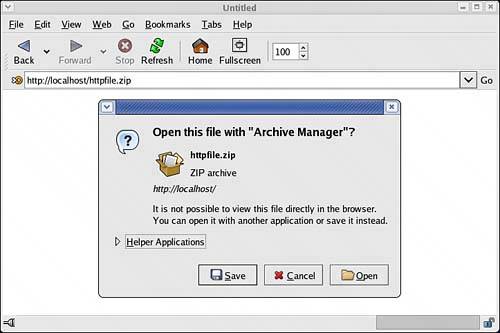Returning Files with an HTTP Request
$filename = 'httpfile.zip';
header("Content-Disposition: attachment; filename =
$filename");
|
When a PHP script shall return a (downloadable) file instead of HTML, the correct HTTP headers have to be sent:
Content-Disposition for the (proposed) name of the file Content-Length for the file size Content-Type for the MIME type of the file
The preceding code reads in a ZIP file and sends it to the client; Figure 6.6 shows its result in the browser.
Sending a File with HTTP (httpfile.php)
<?php
$filename = 'httpfile.zip';
$mimetype = 'application/zip';
$data = file_get_contents($filename);
$size = strlen($data);
header("Content-Disposition: attachment; filename
= $filename");
header("Content-Length: $size");
header("Content-Type: $mimetype");
echo $data;
?>

|
The following PEAR packages offer functionality that can be used for working with files and streams:
File offers some helper functions for file access, some of the deprecated to new functionality in more recent PHP releases File_Find searches a path for certain files or patterns File_SearchReplace does a Search and Replace within files Stream_Var allows you to save variables in streams, so you can access them like you would access files or streams
|
| 